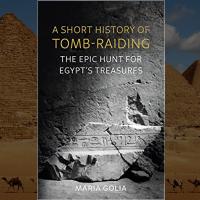Maria Golia’s A Short History of Tomb-Raiding provides just that: a history of tomb-raiding in Egypt, from the time of the ancients through to the present day. Utilizing her unique experience as an American who has not only lived in Egypt for several decades, but who has also written extensively on the country’s past and present, she takes the reader on a whirlwind tour of what seems to be Egypt’s national pastime: the hunt for buried treasure. Within this, A Short History of Tomb-Raiding follows the corruption and less-than-honest practices of everyone in ancient Egypt – from tomb builders and people tasked with mummifying bodies all the way up to officials and pharaohs – through the Middle Ages, to the acquisition of Egypt's heritage by museums worldwide in the last two centuries.
More than this, Golia offers a general running commentary on the state of Egypt across the years. Politics, life and religion under the Old and New Kingdoms, as well as under the Ptolemies, is discussed in detail, providing necessary context and a well-delivered explanation about the basis of Egyptian religious practice and the cult of the dead. The rise of Islam and the thirst for knowledge, as well as the deep cultural impact of works like One Thousand and One Nights are discussed in all their captivating splendour. The fever for relic-hunting and the imperialist rush to fill museums – and stately homes – during the eighteenth and nineteenth centuries not only shows how the development of archaeology and Egyptology has helped our understanding of this mysterious land and its history, but also how the European race for glory has impacted the people living in Egypt. Furthermore, the modern attempt to capitalize on the public's thirst for all things Egypt is shown in a balanced, nuanced light. The background provided by those peoples who survive in the literal shadow of the pyramids, scratching their living in the dust and ruins, sometimes honestly, sometimes less so, is a constant reminder that there are multiple facets to this story. The beauty of this book is that it is Egypt from the other side: it is tomb-raiding as a social and cultural phenomenon, leaving a deep impact on those living there. A Short History of Tomb-Raiding is, therefore, also a short history of Egyptians. It is a much better-rounded narrative than those books, focused solely on treasure, that have gone before.
The message of responsibility features heavily across the book. The questions it raises, just like the hunt for Egypt’s treasure, are eternal. How does one separate greed from need? How can we mediate between the battle for the survival of artefacts and for the survival of groups, families and individuals? Should the wealth of the tombs remain national treasures, or should they be part of a shared cultural heritage? Should the final resting place of people be disturbed at all, and does the spread of items across the globe protect Egypt’s physical history, or does it destroy it? These are all relevant questions, all the more so in 2022, where the big anniversaries of Egyptology – the translation of the Rosetta Stone, the finding of Tutankhamun’s tomb – feature more heavily than normal in the public consciousness. But beyond that, they tap into the ongoing disputes between museums parading the wealth of other cultures and those campaigning for the return of objects to their countries of origin.
There are no easy solutions, so it is little surprise that A Short History of Tomb-Raiding poses more questions than it answers. Ultimately, the decisions are left to be made by the reader, and this lack of resolution might leave some wanting. Although the book is written in an easy, flowing style, it is a serious addition to the cannon. Readers who are looking for the author to delve into the mystical, into the myth and magic of the tombs, or even into the Indiana Jones-esque perils of tomb-raiding, might be left dissatisfied. Instead, this is a grown-up, holistic account of tomb-raiding, with a relevance and immediacy that is as unusual as finding that fabled cache of gold.


